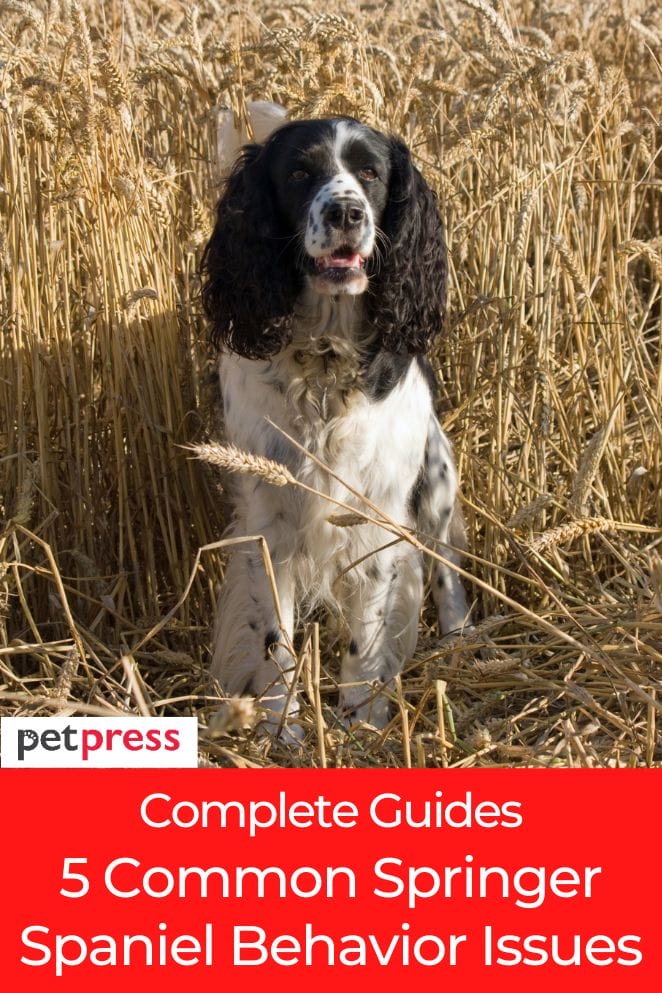
As a proud owner of a Springer Spaniel, you’re likely well-acquainted with the delightful quirks that come with these dogs.
Despite their boundless energy and friendly nature, Springer Spaniels can sometimes exhibit behavior issues that require our attention.
In this article, we’ll investigate the common behavioral challenges of Springer Spaniels, investigate the hidden reasons for these issues, give viable tips to really oversee them, and wrap up with replies to a few habitually gotten clarification on some things.
When you complete the process of perusing, you’ll be more ready to keep an agreeable and satisfying relationship with your valued Springer Spaniel.
Common Springer Spaniel Behavior Problems
Springer Spaniels are wonderful and lively dogs, but like any breed, they can exhibit certain behavior problems that may require attention and training.
Let’s dive into some of the common behavioral issues you might encounter with Springer Spaniels and how to address them.
Excessive barking
Springer Spaniels are known for their vocal nature.
While their barking can be a way of alerting you to something or expressing excitement, it can become a nuisance if it happens too frequently.
To address excessive barking, it’s essential to provide them with mental and physical stimulation.
Regular exercise, interactive toys, and training can help redirect their energy in a more constructive way.
Separation anxiety
These dogs are incredibly loyal and often form strong bonds with their owners.
This attachment can lead to separation anxiety when left alone.
To combat this, start by gradually acclimating your Springer Spaniel to being alone for short periods.
Use positive reinforcement and create a comfortable space for them.
You can also consider the help of a professional dog trainer or a behaviorist if the anxiety is severe.
Chasing behavior
Springer Spaniels have a strong prey drive due to their hunting instincts.
This can manifest as chasing small animals or even cars. To manage this behavior, leash training is crucial.
Use a sturdy leash and practice commands like “leave it” and “stay” during walks.
It’s important to redirect their attention and reinforce that chasing is not acceptable.
Digging
Some Springer Spaniels may develop a habit of digging holes in your yard, which can be frustrating for any dog owner.
This behavior often stems from boredom or a desire to cool down if the ground is cooler than the air.
Providing them with a designated digging area filled with soft soil or sand can help redirect this instinct and protect your garden.
Aggression
While not common, Springer Spaniels can exhibit aggression towards other dogs or people.
It’s essential to socialize your dog from a young age, exposing them to various situations, people, and dogs in controlled environments.
If aggression issues arise, consult a professional dog trainer or behaviorist who can assess the situation and provide tailored guidance.

Causes of Springer Spaniel Behavior Problems
Understanding the root causes of behavior problems in Springer Spaniels is essential for effective intervention and prevention.
Let’s delve deeper into these causes to gain a comprehensive understanding:
Lack of exercise
One thing you’ll notice about Springer Spaniels is their incredible energy levels.
If you don’t give them enough physical activity, it can lead to a whole bunch of behavior issues.
Picture this: a restless Springer Spaniel, pacing around anxiously, maybe even resorting to chewing on your furniture or going on a barking spree. It’s not a pretty sight.
Socialization deficits
Adequate socialization during a Springer Spaniel’s puppyhood is vital for their well-rounded development.
When they miss out on exposure to various people, animals, and environments, they can develop fear and aggression issues.
Proper socialization helps them become confident and adaptable dogs, reducing the likelihood of aggressive behavior toward strangers or other dogs.
Boredom
Springer Spaniels are highly intelligent dogs that thrive on mental stimulation.
When they are not mentally challenged, they may become bored, leading to undesirable behaviors like digging, excessive barking, or even escaping from the yard.
Providing puzzle toys, interactive games, and training sessions can keep their minds engaged and prevent boredom-related issues.
Genetics
While not all behavior problems in Springer Spaniels can be attributed to genetics, some may have a genetic component.
Certain traits, such as fearfulness or aggression, can be inherited.
Responsible breeding practices and selecting a reputable breeder who prioritizes temperament can help reduce the likelihood of genetic behavior issues.
Anxiety and stress
Springer Spaniels can be sensitive dogs, and changes in their environment or traumatic experiences can trigger anxiety and stress, leading to behavior problems.
Events like moving to a new home, the addition of a new family member, or loud noises like thunderstorms or fireworks can provoke anxiety.
Providing a safe and secure environment, along with positive reinforcement training, can help ease their anxiety.

Tips for Managing Springer Spaniel Behavior Problems
Managing behavior problems in Springer Spaniels requires a thoughtful and consistent approach.
Here are some detailed tips to help you effectively address and prevent these issues:
Regular exercise
Given their high energy levels, Springer Spaniels thrive on physical activity.
Ensure they get plenty of exercise through daily walks, runs, or play sessions.
Engaging them in games of fetch or agility activities can also help burn off excess energy and reduce the likelihood of behavioral problems stemming from boredom.
Mental stimulation
Springer Spaniels are intelligent dogs that need mental stimulation as much as physical exercise.
Provide them with puzzle toys, interactive feeders, and training sessions to challenge their minds.
Teaching them new tricks or commands not only keeps them engaged but also strengthens your bond.
Positive reinforcement
Use positive reinforcement techniques during training.
Reward your Springer Spaniel with treats, praise, or toys when they exhibit desired behaviors.
This encourages them to repeat those behaviors and reinforces the bond between you and your dog. Avoid harsh punishments, as they can lead to fear and anxiety.
Socialization
Early and ongoing socialization is crucial.
Expose your puppy to various people, animals, and environments to build their confidence and reduce the chances of fear or aggression issues later in life.
Puppy socialization classes can be beneficial for this purpose.
Consistency
Consistency in your commands, routines, and rules is key to preventing confusion.
Ensure that everyone in your household follows the same rules and uses the same commands.
Springer Spaniels respond well to clear and consistent expectations.
Crate Training
Crate training can help with separation anxiety and prevent destructive behaviors when you’re not at home.
Make the crate a comfortable and safe space, and gradually increase the amount of time your dog spends in it to build their tolerance.

Professional help
If behavior problems persist or if they are severe, consider seeking professional help.
A certified dog trainer or behaviorist can assess your Springer Spaniel’s specific issues and create a customized training plan.
They can also provide guidance on managing more challenging behaviors.
Patience and understanding
Remember that behavior problems often take time to resolve.
Be patient with your dog, and approach training with understanding and empathy.
Consistent training and positive reinforcement can go a long way in addressing and preventing issues.
Environmental enrichment
Create an enriching environment for your Springer Spaniel.
Rotate toys to keep them interesting, provide opportunities for exploration, and vary your walks to expose them to different sights and smells.
This can prevent boredom and curb destructive behaviors.
Conclusion
In the end, Springer Spaniels prove to be incredible companions.
However, as with any dog breed out there, they too might grapple with behavioral hurdles on occasion.
It’s pivotal to truly understand the common issues they might come across, the root causes behind these hiccups, and how to tackle them.
By doing so, you can guarantee that your Springer Spaniel remains a source of joy and a well-behaved addition to your family.
FAQs
Absolutely! With proper training and socialization, Springer Spaniels can make excellent family pets.
Identify the triggers for barking and use positive reinforcement to redirect their attention.
They require at least 1-2 hours of exercise per day, including playtime and walks.
Yes, they are generally good with children, but supervision is important to prevent any rough play.
If your efforts to manage behavior problems aren’t successful, consult a professional dog trainer or behaviorist.
- Does Cat Litter Melt Ice? The Complete Guide to Winter Safety - January 30, 2026
- Happy Tail Dogs: Understanding This Common Canine Condition - January 29, 2026
- How Cold Can Outdoor Cats Handle? Feline Winter Safety - January 27, 2026


GIPHY App Key not set. Please check settings